Evaluation of Leadership and Management Roles at TESCO Ltd. Report
VerifiedAdded on 2023/01/11
|14
|4446
|42
Report
AI Summary
This report examines the distinct roles of leaders and managers within TESCO Ltd., a British supermarket chain. It begins by differentiating between leadership and management, highlighting their respective functions and characteristics. The report then explores various leadership theories, including transformational leadership and management by objectives, and discusses the crucial qualities of effective leaders and managers. It further analyzes how leaders and managers perform in different organizational situations, such as performance and change management. The report also delves into situational, systems, and contingency leadership theories, evaluating their applicability within TESCO's operational context. Finally, the report assesses the implications of various business factors on decision-making and operational management within the organization.
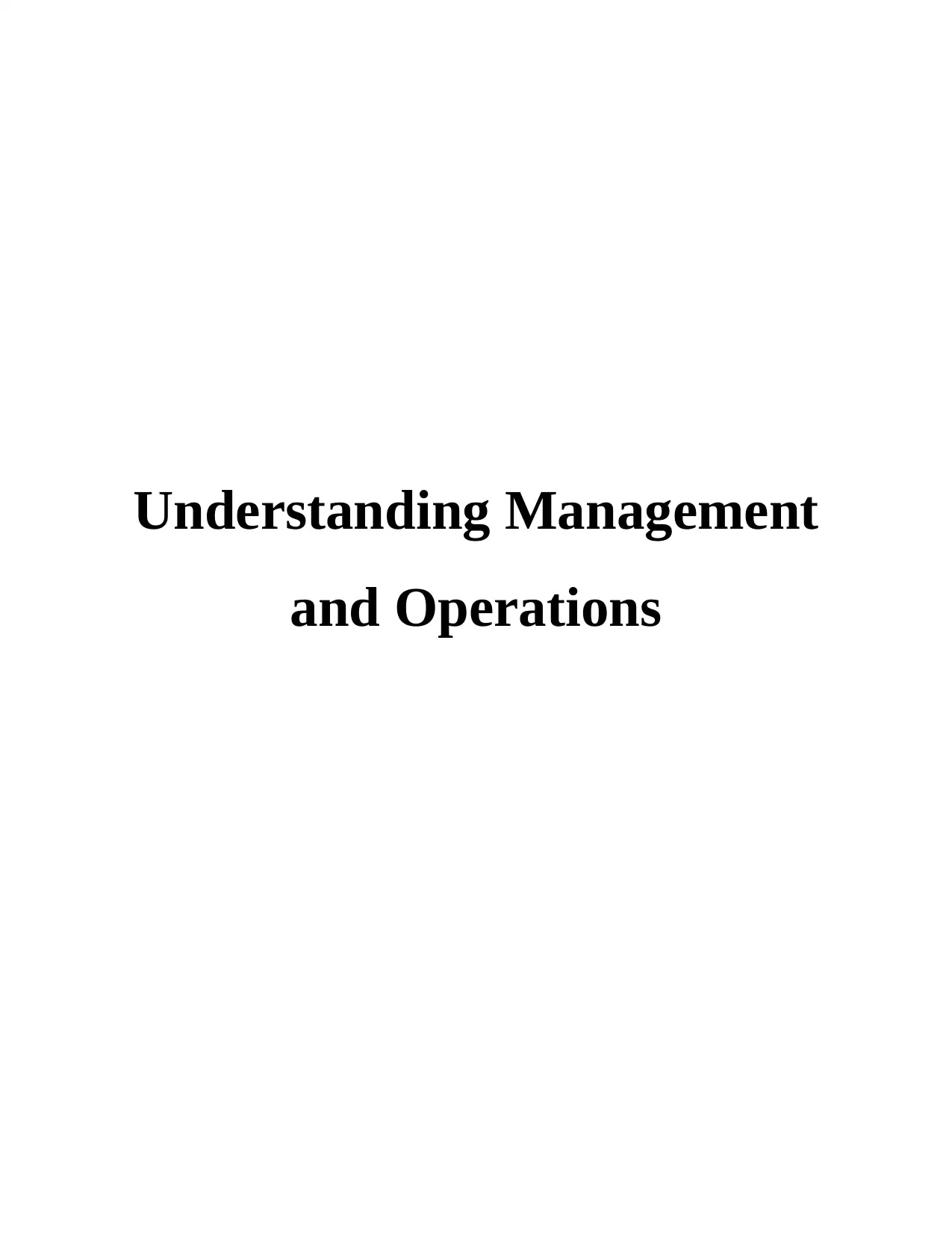
Understanding Management
and Operations
and Operations
Paraphrase This Document
Need a fresh take? Get an instant paraphrase of this document with our AI Paraphraser
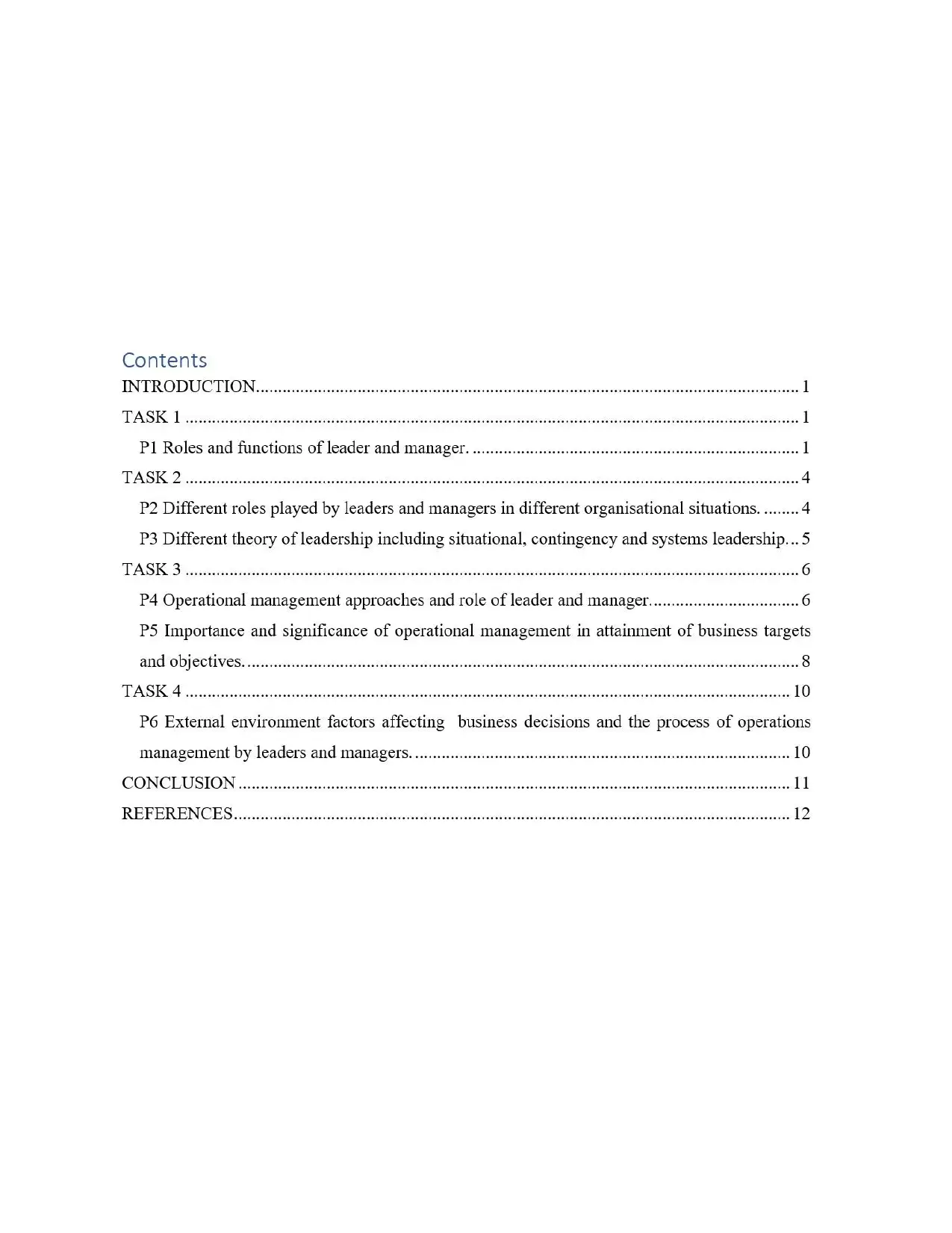
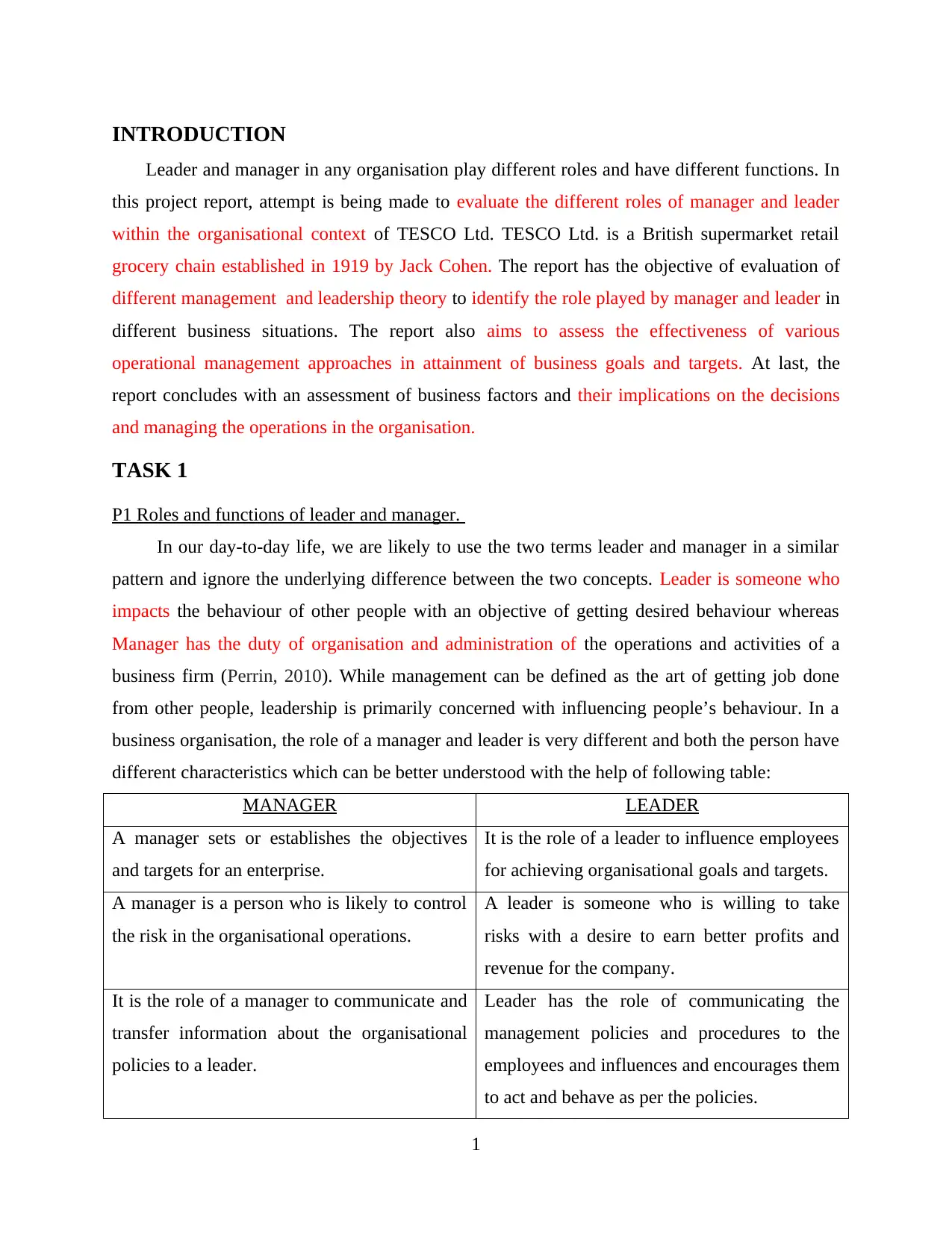
INTRODUCTION
Leader and manager in any organisation play different roles and have different functions. In
this project report, attempt is being made to evaluate the different roles of manager and leader
within the organisational context of TESCO Ltd. TESCO Ltd. is a British supermarket retail
grocery chain established in 1919 by Jack Cohen. The report has the objective of evaluation of
different management and leadership theory to identify the role played by manager and leader in
different business situations. The report also aims to assess the effectiveness of various
operational management approaches in attainment of business goals and targets. At last, the
report concludes with an assessment of business factors and their implications on the decisions
and managing the operations in the organisation.
TASK 1
P1 Roles and functions of leader and manager.
In our day-to-day life, we are likely to use the two terms leader and manager in a similar
pattern and ignore the underlying difference between the two concepts. Leader is someone who
impacts the behaviour of other people with an objective of getting desired behaviour whereas
Manager has the duty of organisation and administration of the operations and activities of a
business firm (Perrin, 2010). While management can be defined as the art of getting job done
from other people, leadership is primarily concerned with influencing people’s behaviour. In a
business organisation, the role of a manager and leader is very different and both the person have
different characteristics which can be better understood with the help of following table:
MANAGER LEADER
A manager sets or establishes the objectives
and targets for an enterprise.
It is the role of a leader to influence employees
for achieving organisational goals and targets.
A manager is a person who is likely to control
the risk in the organisational operations.
A leader is someone who is willing to take
risks with a desire to earn better profits and
revenue for the company.
It is the role of a manager to communicate and
transfer information about the organisational
policies to a leader.
Leader has the role of communicating the
management policies and procedures to the
employees and influences and encourages them
to act and behave as per the policies.
1
Leader and manager in any organisation play different roles and have different functions. In
this project report, attempt is being made to evaluate the different roles of manager and leader
within the organisational context of TESCO Ltd. TESCO Ltd. is a British supermarket retail
grocery chain established in 1919 by Jack Cohen. The report has the objective of evaluation of
different management and leadership theory to identify the role played by manager and leader in
different business situations. The report also aims to assess the effectiveness of various
operational management approaches in attainment of business goals and targets. At last, the
report concludes with an assessment of business factors and their implications on the decisions
and managing the operations in the organisation.
TASK 1
P1 Roles and functions of leader and manager.
In our day-to-day life, we are likely to use the two terms leader and manager in a similar
pattern and ignore the underlying difference between the two concepts. Leader is someone who
impacts the behaviour of other people with an objective of getting desired behaviour whereas
Manager has the duty of organisation and administration of the operations and activities of a
business firm (Perrin, 2010). While management can be defined as the art of getting job done
from other people, leadership is primarily concerned with influencing people’s behaviour. In a
business organisation, the role of a manager and leader is very different and both the person have
different characteristics which can be better understood with the help of following table:
MANAGER LEADER
A manager sets or establishes the objectives
and targets for an enterprise.
It is the role of a leader to influence employees
for achieving organisational goals and targets.
A manager is a person who is likely to control
the risk in the organisational operations.
A leader is someone who is willing to take
risks with a desire to earn better profits and
revenue for the company.
It is the role of a manager to communicate and
transfer information about the organisational
policies to a leader.
Leader has the role of communicating the
management policies and procedures to the
employees and influences and encourages them
to act and behave as per the policies.
1
⊘ This is a preview!⊘
Do you want full access?
Subscribe today to unlock all pages.

Trusted by 1+ million students worldwide
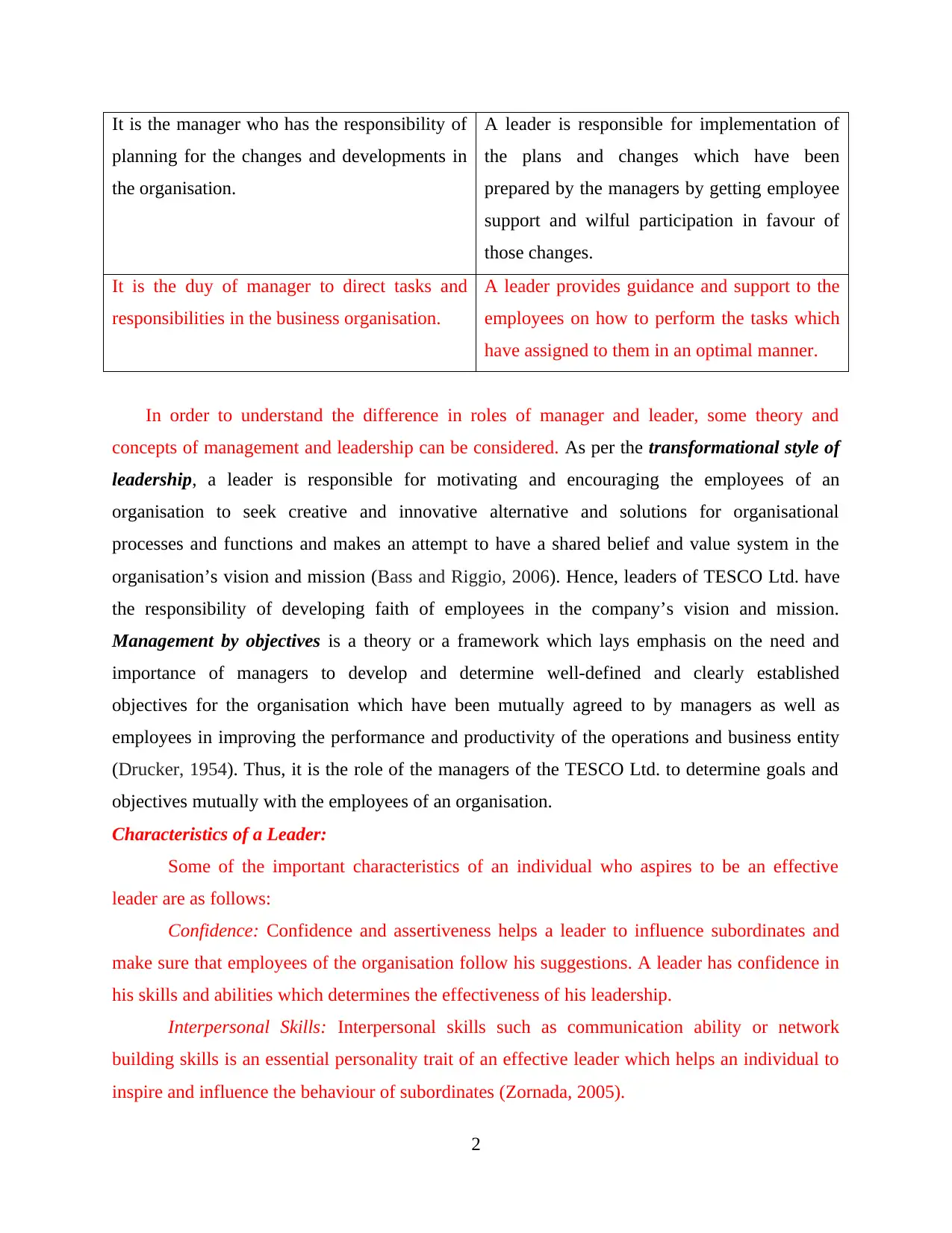
It is the manager who has the responsibility of
planning for the changes and developments in
the organisation.
A leader is responsible for implementation of
the plans and changes which have been
prepared by the managers by getting employee
support and wilful participation in favour of
those changes.
It is the duy of manager to direct tasks and
responsibilities in the business organisation.
A leader provides guidance and support to the
employees on how to perform the tasks which
have assigned to them in an optimal manner.
In order to understand the difference in roles of manager and leader, some theory and
concepts of management and leadership can be considered. As per the transformational style of
leadership, a leader is responsible for motivating and encouraging the employees of an
organisation to seek creative and innovative alternative and solutions for organisational
processes and functions and makes an attempt to have a shared belief and value system in the
organisation’s vision and mission (Bass and Riggio, 2006). Hence, leaders of TESCO Ltd. have
the responsibility of developing faith of employees in the company’s vision and mission.
Management by objectives is a theory or a framework which lays emphasis on the need and
importance of managers to develop and determine well-defined and clearly established
objectives for the organisation which have been mutually agreed to by managers as well as
employees in improving the performance and productivity of the operations and business entity
(Drucker, 1954). Thus, it is the role of the managers of the TESCO Ltd. to determine goals and
objectives mutually with the employees of an organisation.
Characteristics of a Leader:
Some of the important characteristics of an individual who aspires to be an effective
leader are as follows:
Confidence: Confidence and assertiveness helps a leader to influence subordinates and
make sure that employees of the organisation follow his suggestions. A leader has confidence in
his skills and abilities which determines the effectiveness of his leadership.
Interpersonal Skills: Interpersonal skills such as communication ability or network
building skills is an essential personality trait of an effective leader which helps an individual to
inspire and influence the behaviour of subordinates (Zornada, 2005).
2
planning for the changes and developments in
the organisation.
A leader is responsible for implementation of
the plans and changes which have been
prepared by the managers by getting employee
support and wilful participation in favour of
those changes.
It is the duy of manager to direct tasks and
responsibilities in the business organisation.
A leader provides guidance and support to the
employees on how to perform the tasks which
have assigned to them in an optimal manner.
In order to understand the difference in roles of manager and leader, some theory and
concepts of management and leadership can be considered. As per the transformational style of
leadership, a leader is responsible for motivating and encouraging the employees of an
organisation to seek creative and innovative alternative and solutions for organisational
processes and functions and makes an attempt to have a shared belief and value system in the
organisation’s vision and mission (Bass and Riggio, 2006). Hence, leaders of TESCO Ltd. have
the responsibility of developing faith of employees in the company’s vision and mission.
Management by objectives is a theory or a framework which lays emphasis on the need and
importance of managers to develop and determine well-defined and clearly established
objectives for the organisation which have been mutually agreed to by managers as well as
employees in improving the performance and productivity of the operations and business entity
(Drucker, 1954). Thus, it is the role of the managers of the TESCO Ltd. to determine goals and
objectives mutually with the employees of an organisation.
Characteristics of a Leader:
Some of the important characteristics of an individual who aspires to be an effective
leader are as follows:
Confidence: Confidence and assertiveness helps a leader to influence subordinates and
make sure that employees of the organisation follow his suggestions. A leader has confidence in
his skills and abilities which determines the effectiveness of his leadership.
Interpersonal Skills: Interpersonal skills such as communication ability or network
building skills is an essential personality trait of an effective leader which helps an individual to
inspire and influence the behaviour of subordinates (Zornada, 2005).
2
Paraphrase This Document
Need a fresh take? Get an instant paraphrase of this document with our AI Paraphraser
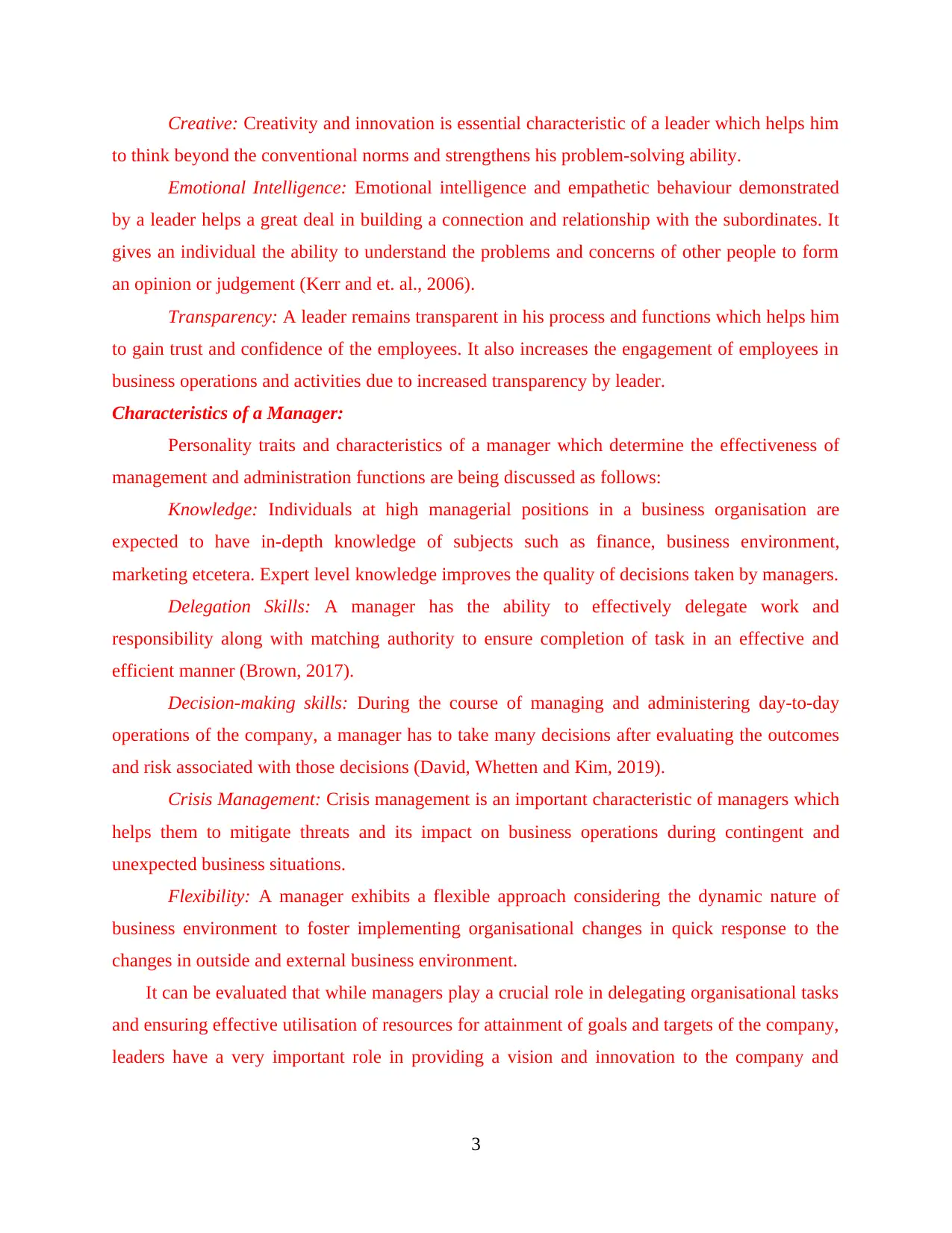
Creative: Creativity and innovation is essential characteristic of a leader which helps him
to think beyond the conventional norms and strengthens his problem-solving ability.
Emotional Intelligence: Emotional intelligence and empathetic behaviour demonstrated
by a leader helps a great deal in building a connection and relationship with the subordinates. It
gives an individual the ability to understand the problems and concerns of other people to form
an opinion or judgement (Kerr and et. al., 2006).
Transparency: A leader remains transparent in his process and functions which helps him
to gain trust and confidence of the employees. It also increases the engagement of employees in
business operations and activities due to increased transparency by leader.
Characteristics of a Manager:
Personality traits and characteristics of a manager which determine the effectiveness of
management and administration functions are being discussed as follows:
Knowledge: Individuals at high managerial positions in a business organisation are
expected to have in-depth knowledge of subjects such as finance, business environment,
marketing etcetera. Expert level knowledge improves the quality of decisions taken by managers.
Delegation Skills: A manager has the ability to effectively delegate work and
responsibility along with matching authority to ensure completion of task in an effective and
efficient manner (Brown, 2017).
Decision-making skills: During the course of managing and administering day-to-day
operations of the company, a manager has to take many decisions after evaluating the outcomes
and risk associated with those decisions (David, Whetten and Kim, 2019).
Crisis Management: Crisis management is an important characteristic of managers which
helps them to mitigate threats and its impact on business operations during contingent and
unexpected business situations.
Flexibility: A manager exhibits a flexible approach considering the dynamic nature of
business environment to foster implementing organisational changes in quick response to the
changes in outside and external business environment.
It can be evaluated that while managers play a crucial role in delegating organisational tasks
and ensuring effective utilisation of resources for attainment of goals and targets of the company,
leaders have a very important role in providing a vision and innovation to the company and
3
to think beyond the conventional norms and strengthens his problem-solving ability.
Emotional Intelligence: Emotional intelligence and empathetic behaviour demonstrated
by a leader helps a great deal in building a connection and relationship with the subordinates. It
gives an individual the ability to understand the problems and concerns of other people to form
an opinion or judgement (Kerr and et. al., 2006).
Transparency: A leader remains transparent in his process and functions which helps him
to gain trust and confidence of the employees. It also increases the engagement of employees in
business operations and activities due to increased transparency by leader.
Characteristics of a Manager:
Personality traits and characteristics of a manager which determine the effectiveness of
management and administration functions are being discussed as follows:
Knowledge: Individuals at high managerial positions in a business organisation are
expected to have in-depth knowledge of subjects such as finance, business environment,
marketing etcetera. Expert level knowledge improves the quality of decisions taken by managers.
Delegation Skills: A manager has the ability to effectively delegate work and
responsibility along with matching authority to ensure completion of task in an effective and
efficient manner (Brown, 2017).
Decision-making skills: During the course of managing and administering day-to-day
operations of the company, a manager has to take many decisions after evaluating the outcomes
and risk associated with those decisions (David, Whetten and Kim, 2019).
Crisis Management: Crisis management is an important characteristic of managers which
helps them to mitigate threats and its impact on business operations during contingent and
unexpected business situations.
Flexibility: A manager exhibits a flexible approach considering the dynamic nature of
business environment to foster implementing organisational changes in quick response to the
changes in outside and external business environment.
It can be evaluated that while managers play a crucial role in delegating organisational tasks
and ensuring effective utilisation of resources for attainment of goals and targets of the company,
leaders have a very important role in providing a vision and innovation to the company and
3
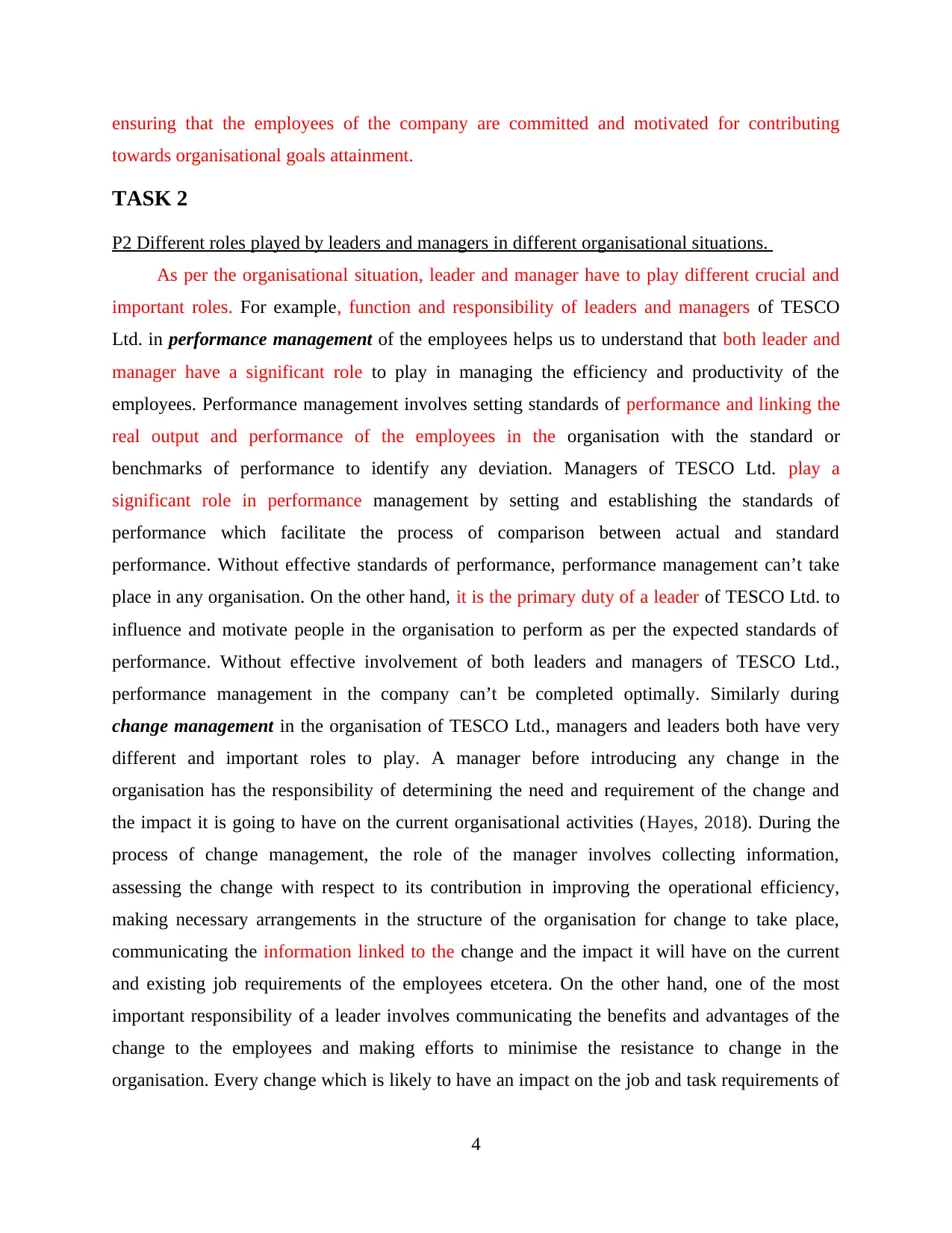
ensuring that the employees of the company are committed and motivated for contributing
towards organisational goals attainment.
TASK 2
P2 Different roles played by leaders and managers in different organisational situations.
As per the organisational situation, leader and manager have to play different crucial and
important roles. For example, function and responsibility of leaders and managers of TESCO
Ltd. in performance management of the employees helps us to understand that both leader and
manager have a significant role to play in managing the efficiency and productivity of the
employees. Performance management involves setting standards of performance and linking the
real output and performance of the employees in the organisation with the standard or
benchmarks of performance to identify any deviation. Managers of TESCO Ltd. play a
significant role in performance management by setting and establishing the standards of
performance which facilitate the process of comparison between actual and standard
performance. Without effective standards of performance, performance management can’t take
place in any organisation. On the other hand, it is the primary duty of a leader of TESCO Ltd. to
influence and motivate people in the organisation to perform as per the expected standards of
performance. Without effective involvement of both leaders and managers of TESCO Ltd.,
performance management in the company can’t be completed optimally. Similarly during
change management in the organisation of TESCO Ltd., managers and leaders both have very
different and important roles to play. A manager before introducing any change in the
organisation has the responsibility of determining the need and requirement of the change and
the impact it is going to have on the current organisational activities (Hayes, 2018). During the
process of change management, the role of the manager involves collecting information,
assessing the change with respect to its contribution in improving the operational efficiency,
making necessary arrangements in the structure of the organisation for change to take place,
communicating the information linked to the change and the impact it will have on the current
and existing job requirements of the employees etcetera. On the other hand, one of the most
important responsibility of a leader involves communicating the benefits and advantages of the
change to the employees and making efforts to minimise the resistance to change in the
organisation. Every change which is likely to have an impact on the job and task requirements of
4
towards organisational goals attainment.
TASK 2
P2 Different roles played by leaders and managers in different organisational situations.
As per the organisational situation, leader and manager have to play different crucial and
important roles. For example, function and responsibility of leaders and managers of TESCO
Ltd. in performance management of the employees helps us to understand that both leader and
manager have a significant role to play in managing the efficiency and productivity of the
employees. Performance management involves setting standards of performance and linking the
real output and performance of the employees in the organisation with the standard or
benchmarks of performance to identify any deviation. Managers of TESCO Ltd. play a
significant role in performance management by setting and establishing the standards of
performance which facilitate the process of comparison between actual and standard
performance. Without effective standards of performance, performance management can’t take
place in any organisation. On the other hand, it is the primary duty of a leader of TESCO Ltd. to
influence and motivate people in the organisation to perform as per the expected standards of
performance. Without effective involvement of both leaders and managers of TESCO Ltd.,
performance management in the company can’t be completed optimally. Similarly during
change management in the organisation of TESCO Ltd., managers and leaders both have very
different and important roles to play. A manager before introducing any change in the
organisation has the responsibility of determining the need and requirement of the change and
the impact it is going to have on the current organisational activities (Hayes, 2018). During the
process of change management, the role of the manager involves collecting information,
assessing the change with respect to its contribution in improving the operational efficiency,
making necessary arrangements in the structure of the organisation for change to take place,
communicating the information linked to the change and the impact it will have on the current
and existing job requirements of the employees etcetera. On the other hand, one of the most
important responsibility of a leader involves communicating the benefits and advantages of the
change to the employees and making efforts to minimise the resistance to change in the
organisation. Every change which is likely to have an impact on the job and task requirements of
4
⊘ This is a preview!⊘
Do you want full access?
Subscribe today to unlock all pages.

Trusted by 1+ million students worldwide
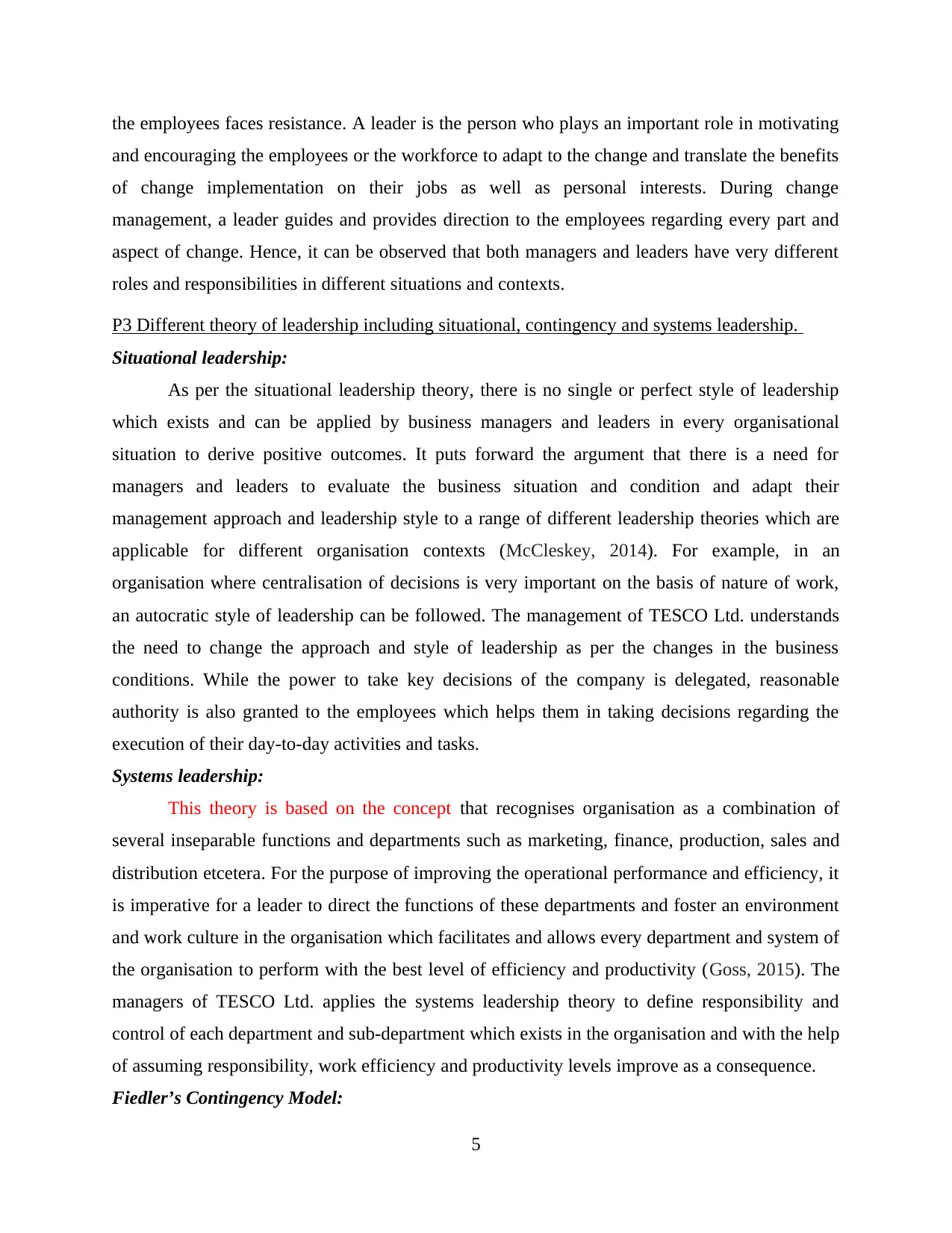
the employees faces resistance. A leader is the person who plays an important role in motivating
and encouraging the employees or the workforce to adapt to the change and translate the benefits
of change implementation on their jobs as well as personal interests. During change
management, a leader guides and provides direction to the employees regarding every part and
aspect of change. Hence, it can be observed that both managers and leaders have very different
roles and responsibilities in different situations and contexts.
P3 Different theory of leadership including situational, contingency and systems leadership.
Situational leadership:
As per the situational leadership theory, there is no single or perfect style of leadership
which exists and can be applied by business managers and leaders in every organisational
situation to derive positive outcomes. It puts forward the argument that there is a need for
managers and leaders to evaluate the business situation and condition and adapt their
management approach and leadership style to a range of different leadership theories which are
applicable for different organisation contexts (McCleskey, 2014). For example, in an
organisation where centralisation of decisions is very important on the basis of nature of work,
an autocratic style of leadership can be followed. The management of TESCO Ltd. understands
the need to change the approach and style of leadership as per the changes in the business
conditions. While the power to take key decisions of the company is delegated, reasonable
authority is also granted to the employees which helps them in taking decisions regarding the
execution of their day-to-day activities and tasks.
Systems leadership:
This theory is based on the concept that recognises organisation as a combination of
several inseparable functions and departments such as marketing, finance, production, sales and
distribution etcetera. For the purpose of improving the operational performance and efficiency, it
is imperative for a leader to direct the functions of these departments and foster an environment
and work culture in the organisation which facilitates and allows every department and system of
the organisation to perform with the best level of efficiency and productivity (Goss, 2015). The
managers of TESCO Ltd. applies the systems leadership theory to define responsibility and
control of each department and sub-department which exists in the organisation and with the help
of assuming responsibility, work efficiency and productivity levels improve as a consequence.
Fiedler’s Contingency Model:
5
and encouraging the employees or the workforce to adapt to the change and translate the benefits
of change implementation on their jobs as well as personal interests. During change
management, a leader guides and provides direction to the employees regarding every part and
aspect of change. Hence, it can be observed that both managers and leaders have very different
roles and responsibilities in different situations and contexts.
P3 Different theory of leadership including situational, contingency and systems leadership.
Situational leadership:
As per the situational leadership theory, there is no single or perfect style of leadership
which exists and can be applied by business managers and leaders in every organisational
situation to derive positive outcomes. It puts forward the argument that there is a need for
managers and leaders to evaluate the business situation and condition and adapt their
management approach and leadership style to a range of different leadership theories which are
applicable for different organisation contexts (McCleskey, 2014). For example, in an
organisation where centralisation of decisions is very important on the basis of nature of work,
an autocratic style of leadership can be followed. The management of TESCO Ltd. understands
the need to change the approach and style of leadership as per the changes in the business
conditions. While the power to take key decisions of the company is delegated, reasonable
authority is also granted to the employees which helps them in taking decisions regarding the
execution of their day-to-day activities and tasks.
Systems leadership:
This theory is based on the concept that recognises organisation as a combination of
several inseparable functions and departments such as marketing, finance, production, sales and
distribution etcetera. For the purpose of improving the operational performance and efficiency, it
is imperative for a leader to direct the functions of these departments and foster an environment
and work culture in the organisation which facilitates and allows every department and system of
the organisation to perform with the best level of efficiency and productivity (Goss, 2015). The
managers of TESCO Ltd. applies the systems leadership theory to define responsibility and
control of each department and sub-department which exists in the organisation and with the help
of assuming responsibility, work efficiency and productivity levels improve as a consequence.
Fiedler’s Contingency Model:
5
Paraphrase This Document
Need a fresh take? Get an instant paraphrase of this document with our AI Paraphraser
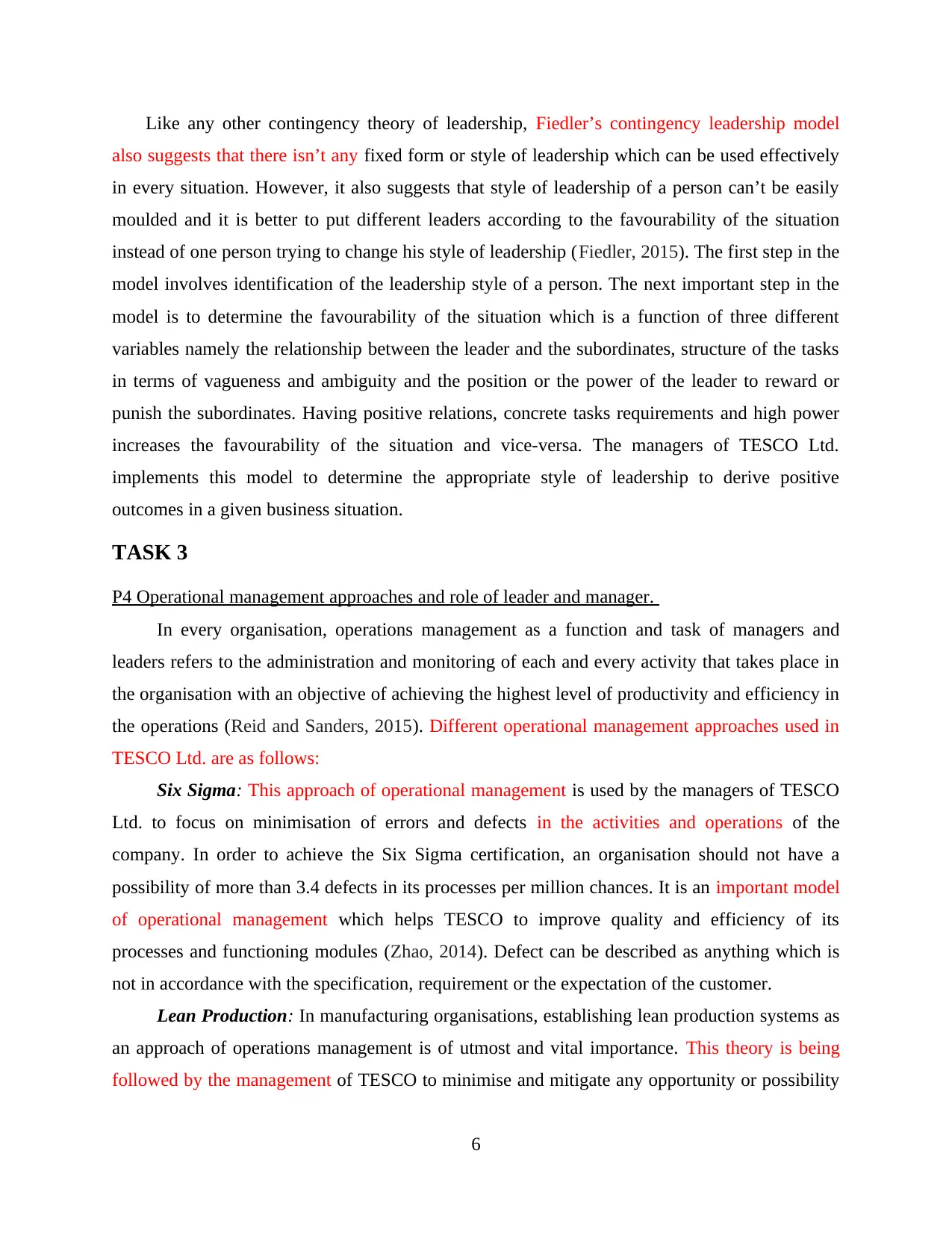
Like any other contingency theory of leadership, Fiedler’s contingency leadership model
also suggests that there isn’t any fixed form or style of leadership which can be used effectively
in every situation. However, it also suggests that style of leadership of a person can’t be easily
moulded and it is better to put different leaders according to the favourability of the situation
instead of one person trying to change his style of leadership (Fiedler, 2015). The first step in the
model involves identification of the leadership style of a person. The next important step in the
model is to determine the favourability of the situation which is a function of three different
variables namely the relationship between the leader and the subordinates, structure of the tasks
in terms of vagueness and ambiguity and the position or the power of the leader to reward or
punish the subordinates. Having positive relations, concrete tasks requirements and high power
increases the favourability of the situation and vice-versa. The managers of TESCO Ltd.
implements this model to determine the appropriate style of leadership to derive positive
outcomes in a given business situation.
TASK 3
P4 Operational management approaches and role of leader and manager.
In every organisation, operations management as a function and task of managers and
leaders refers to the administration and monitoring of each and every activity that takes place in
the organisation with an objective of achieving the highest level of productivity and efficiency in
the operations (Reid and Sanders, 2015). Different operational management approaches used in
TESCO Ltd. are as follows:
Six Sigma: This approach of operational management is used by the managers of TESCO
Ltd. to focus on minimisation of errors and defects in the activities and operations of the
company. In order to achieve the Six Sigma certification, an organisation should not have a
possibility of more than 3.4 defects in its processes per million chances. It is an important model
of operational management which helps TESCO to improve quality and efficiency of its
processes and functioning modules (Zhao, 2014). Defect can be described as anything which is
not in accordance with the specification, requirement or the expectation of the customer.
Lean Production: In manufacturing organisations, establishing lean production systems as
an approach of operations management is of utmost and vital importance. This theory is being
followed by the management of TESCO to minimise and mitigate any opportunity or possibility
6
also suggests that there isn’t any fixed form or style of leadership which can be used effectively
in every situation. However, it also suggests that style of leadership of a person can’t be easily
moulded and it is better to put different leaders according to the favourability of the situation
instead of one person trying to change his style of leadership (Fiedler, 2015). The first step in the
model involves identification of the leadership style of a person. The next important step in the
model is to determine the favourability of the situation which is a function of three different
variables namely the relationship between the leader and the subordinates, structure of the tasks
in terms of vagueness and ambiguity and the position or the power of the leader to reward or
punish the subordinates. Having positive relations, concrete tasks requirements and high power
increases the favourability of the situation and vice-versa. The managers of TESCO Ltd.
implements this model to determine the appropriate style of leadership to derive positive
outcomes in a given business situation.
TASK 3
P4 Operational management approaches and role of leader and manager.
In every organisation, operations management as a function and task of managers and
leaders refers to the administration and monitoring of each and every activity that takes place in
the organisation with an objective of achieving the highest level of productivity and efficiency in
the operations (Reid and Sanders, 2015). Different operational management approaches used in
TESCO Ltd. are as follows:
Six Sigma: This approach of operational management is used by the managers of TESCO
Ltd. to focus on minimisation of errors and defects in the activities and operations of the
company. In order to achieve the Six Sigma certification, an organisation should not have a
possibility of more than 3.4 defects in its processes per million chances. It is an important model
of operational management which helps TESCO to improve quality and efficiency of its
processes and functioning modules (Zhao, 2014). Defect can be described as anything which is
not in accordance with the specification, requirement or the expectation of the customer.
Lean Production: In manufacturing organisations, establishing lean production systems as
an approach of operations management is of utmost and vital importance. This theory is being
followed by the management of TESCO to minimise and mitigate any opportunity or possibility
6
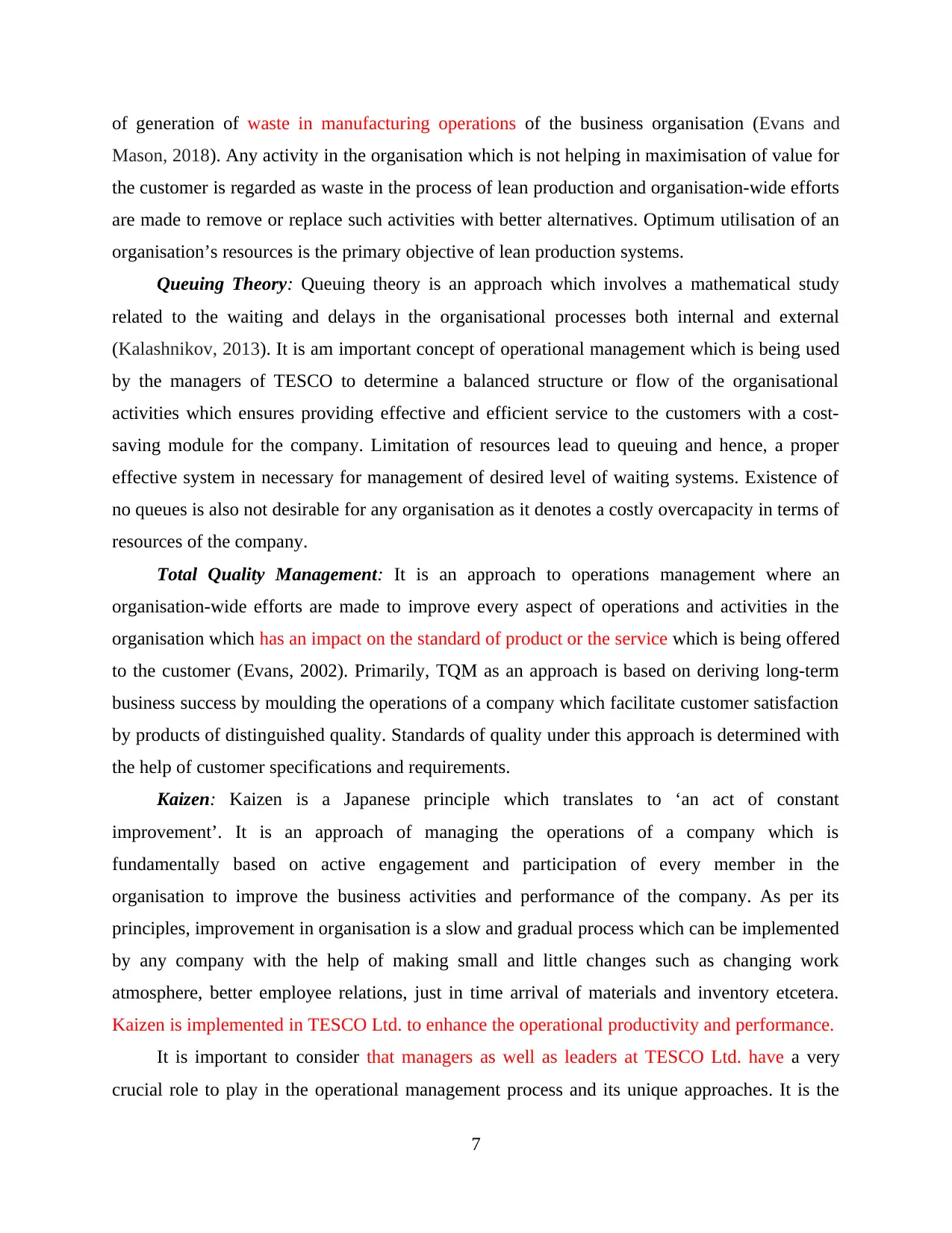
of generation of waste in manufacturing operations of the business organisation (Evans and
Mason, 2018). Any activity in the organisation which is not helping in maximisation of value for
the customer is regarded as waste in the process of lean production and organisation-wide efforts
are made to remove or replace such activities with better alternatives. Optimum utilisation of an
organisation’s resources is the primary objective of lean production systems.
Queuing Theory: Queuing theory is an approach which involves a mathematical study
related to the waiting and delays in the organisational processes both internal and external
(Kalashnikov, 2013). It is am important concept of operational management which is being used
by the managers of TESCO to determine a balanced structure or flow of the organisational
activities which ensures providing effective and efficient service to the customers with a cost-
saving module for the company. Limitation of resources lead to queuing and hence, a proper
effective system in necessary for management of desired level of waiting systems. Existence of
no queues is also not desirable for any organisation as it denotes a costly overcapacity in terms of
resources of the company.
Total Quality Management: It is an approach to operations management where an
organisation-wide efforts are made to improve every aspect of operations and activities in the
organisation which has an impact on the standard of product or the service which is being offered
to the customer (Evans, 2002). Primarily, TQM as an approach is based on deriving long-term
business success by moulding the operations of a company which facilitate customer satisfaction
by products of distinguished quality. Standards of quality under this approach is determined with
the help of customer specifications and requirements.
Kaizen: Kaizen is a Japanese principle which translates to ‘an act of constant
improvement’. It is an approach of managing the operations of a company which is
fundamentally based on active engagement and participation of every member in the
organisation to improve the business activities and performance of the company. As per its
principles, improvement in organisation is a slow and gradual process which can be implemented
by any company with the help of making small and little changes such as changing work
atmosphere, better employee relations, just in time arrival of materials and inventory etcetera.
Kaizen is implemented in TESCO Ltd. to enhance the operational productivity and performance.
It is important to consider that managers as well as leaders at TESCO Ltd. have a very
crucial role to play in the operational management process and its unique approaches. It is the
7
Mason, 2018). Any activity in the organisation which is not helping in maximisation of value for
the customer is regarded as waste in the process of lean production and organisation-wide efforts
are made to remove or replace such activities with better alternatives. Optimum utilisation of an
organisation’s resources is the primary objective of lean production systems.
Queuing Theory: Queuing theory is an approach which involves a mathematical study
related to the waiting and delays in the organisational processes both internal and external
(Kalashnikov, 2013). It is am important concept of operational management which is being used
by the managers of TESCO to determine a balanced structure or flow of the organisational
activities which ensures providing effective and efficient service to the customers with a cost-
saving module for the company. Limitation of resources lead to queuing and hence, a proper
effective system in necessary for management of desired level of waiting systems. Existence of
no queues is also not desirable for any organisation as it denotes a costly overcapacity in terms of
resources of the company.
Total Quality Management: It is an approach to operations management where an
organisation-wide efforts are made to improve every aspect of operations and activities in the
organisation which has an impact on the standard of product or the service which is being offered
to the customer (Evans, 2002). Primarily, TQM as an approach is based on deriving long-term
business success by moulding the operations of a company which facilitate customer satisfaction
by products of distinguished quality. Standards of quality under this approach is determined with
the help of customer specifications and requirements.
Kaizen: Kaizen is a Japanese principle which translates to ‘an act of constant
improvement’. It is an approach of managing the operations of a company which is
fundamentally based on active engagement and participation of every member in the
organisation to improve the business activities and performance of the company. As per its
principles, improvement in organisation is a slow and gradual process which can be implemented
by any company with the help of making small and little changes such as changing work
atmosphere, better employee relations, just in time arrival of materials and inventory etcetera.
Kaizen is implemented in TESCO Ltd. to enhance the operational productivity and performance.
It is important to consider that managers as well as leaders at TESCO Ltd. have a very
crucial role to play in the operational management process and its unique approaches. It is the
7
⊘ This is a preview!⊘
Do you want full access?
Subscribe today to unlock all pages.

Trusted by 1+ million students worldwide
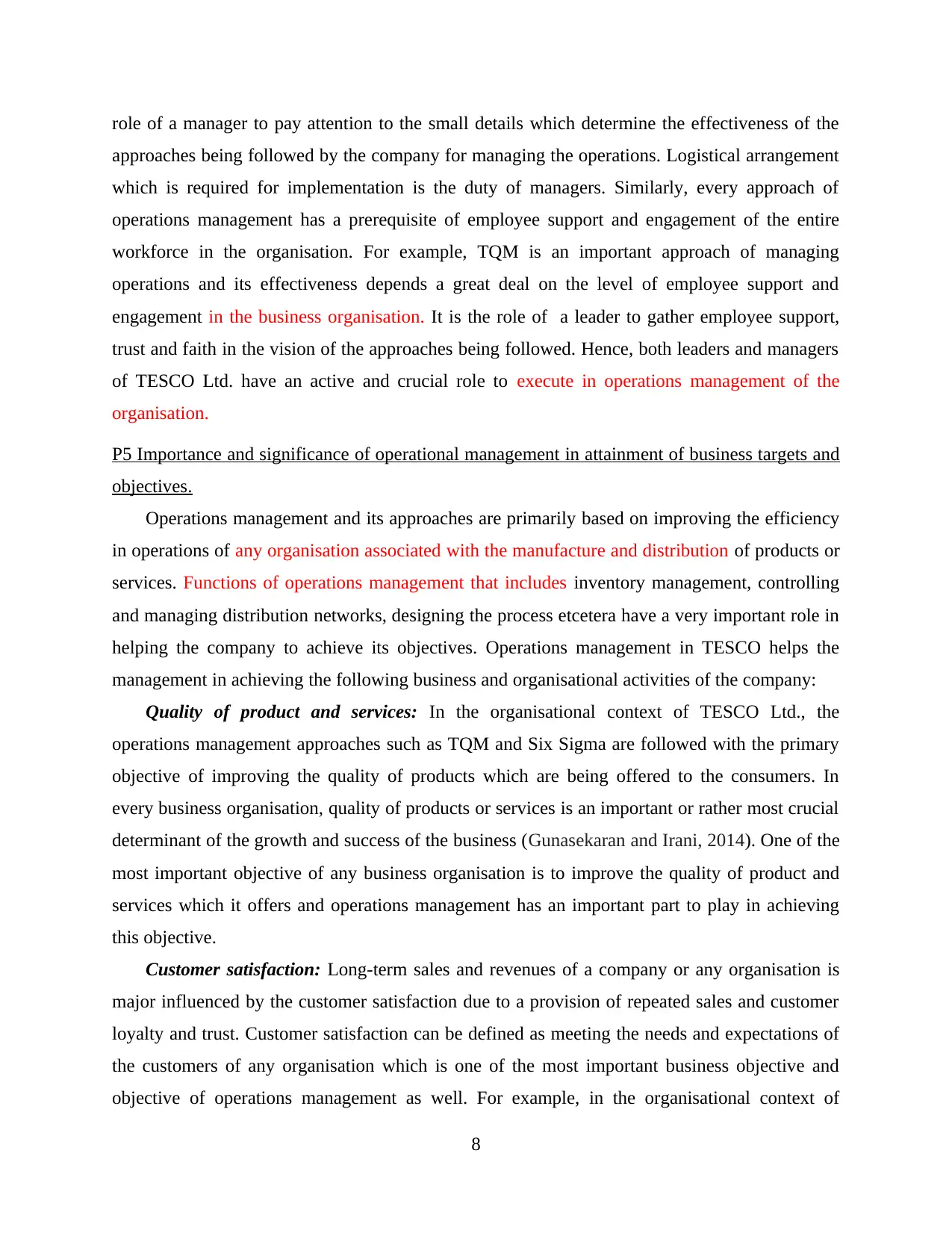
role of a manager to pay attention to the small details which determine the effectiveness of the
approaches being followed by the company for managing the operations. Logistical arrangement
which is required for implementation is the duty of managers. Similarly, every approach of
operations management has a prerequisite of employee support and engagement of the entire
workforce in the organisation. For example, TQM is an important approach of managing
operations and its effectiveness depends a great deal on the level of employee support and
engagement in the business organisation. It is the role of a leader to gather employee support,
trust and faith in the vision of the approaches being followed. Hence, both leaders and managers
of TESCO Ltd. have an active and crucial role to execute in operations management of the
organisation.
P5 Importance and significance of operational management in attainment of business targets and
objectives.
Operations management and its approaches are primarily based on improving the efficiency
in operations of any organisation associated with the manufacture and distribution of products or
services. Functions of operations management that includes inventory management, controlling
and managing distribution networks, designing the process etcetera have a very important role in
helping the company to achieve its objectives. Operations management in TESCO helps the
management in achieving the following business and organisational activities of the company:
Quality of product and services: In the organisational context of TESCO Ltd., the
operations management approaches such as TQM and Six Sigma are followed with the primary
objective of improving the quality of products which are being offered to the consumers. In
every business organisation, quality of products or services is an important or rather most crucial
determinant of the growth and success of the business (Gunasekaran and Irani, 2014). One of the
most important objective of any business organisation is to improve the quality of product and
services which it offers and operations management has an important part to play in achieving
this objective.
Customer satisfaction: Long-term sales and revenues of a company or any organisation is
major influenced by the customer satisfaction due to a provision of repeated sales and customer
loyalty and trust. Customer satisfaction can be defined as meeting the needs and expectations of
the customers of any organisation which is one of the most important business objective and
objective of operations management as well. For example, in the organisational context of
8
approaches being followed by the company for managing the operations. Logistical arrangement
which is required for implementation is the duty of managers. Similarly, every approach of
operations management has a prerequisite of employee support and engagement of the entire
workforce in the organisation. For example, TQM is an important approach of managing
operations and its effectiveness depends a great deal on the level of employee support and
engagement in the business organisation. It is the role of a leader to gather employee support,
trust and faith in the vision of the approaches being followed. Hence, both leaders and managers
of TESCO Ltd. have an active and crucial role to execute in operations management of the
organisation.
P5 Importance and significance of operational management in attainment of business targets and
objectives.
Operations management and its approaches are primarily based on improving the efficiency
in operations of any organisation associated with the manufacture and distribution of products or
services. Functions of operations management that includes inventory management, controlling
and managing distribution networks, designing the process etcetera have a very important role in
helping the company to achieve its objectives. Operations management in TESCO helps the
management in achieving the following business and organisational activities of the company:
Quality of product and services: In the organisational context of TESCO Ltd., the
operations management approaches such as TQM and Six Sigma are followed with the primary
objective of improving the quality of products which are being offered to the consumers. In
every business organisation, quality of products or services is an important or rather most crucial
determinant of the growth and success of the business (Gunasekaran and Irani, 2014). One of the
most important objective of any business organisation is to improve the quality of product and
services which it offers and operations management has an important part to play in achieving
this objective.
Customer satisfaction: Long-term sales and revenues of a company or any organisation is
major influenced by the customer satisfaction due to a provision of repeated sales and customer
loyalty and trust. Customer satisfaction can be defined as meeting the needs and expectations of
the customers of any organisation which is one of the most important business objective and
objective of operations management as well. For example, in the organisational context of
8
Paraphrase This Document
Need a fresh take? Get an instant paraphrase of this document with our AI Paraphraser
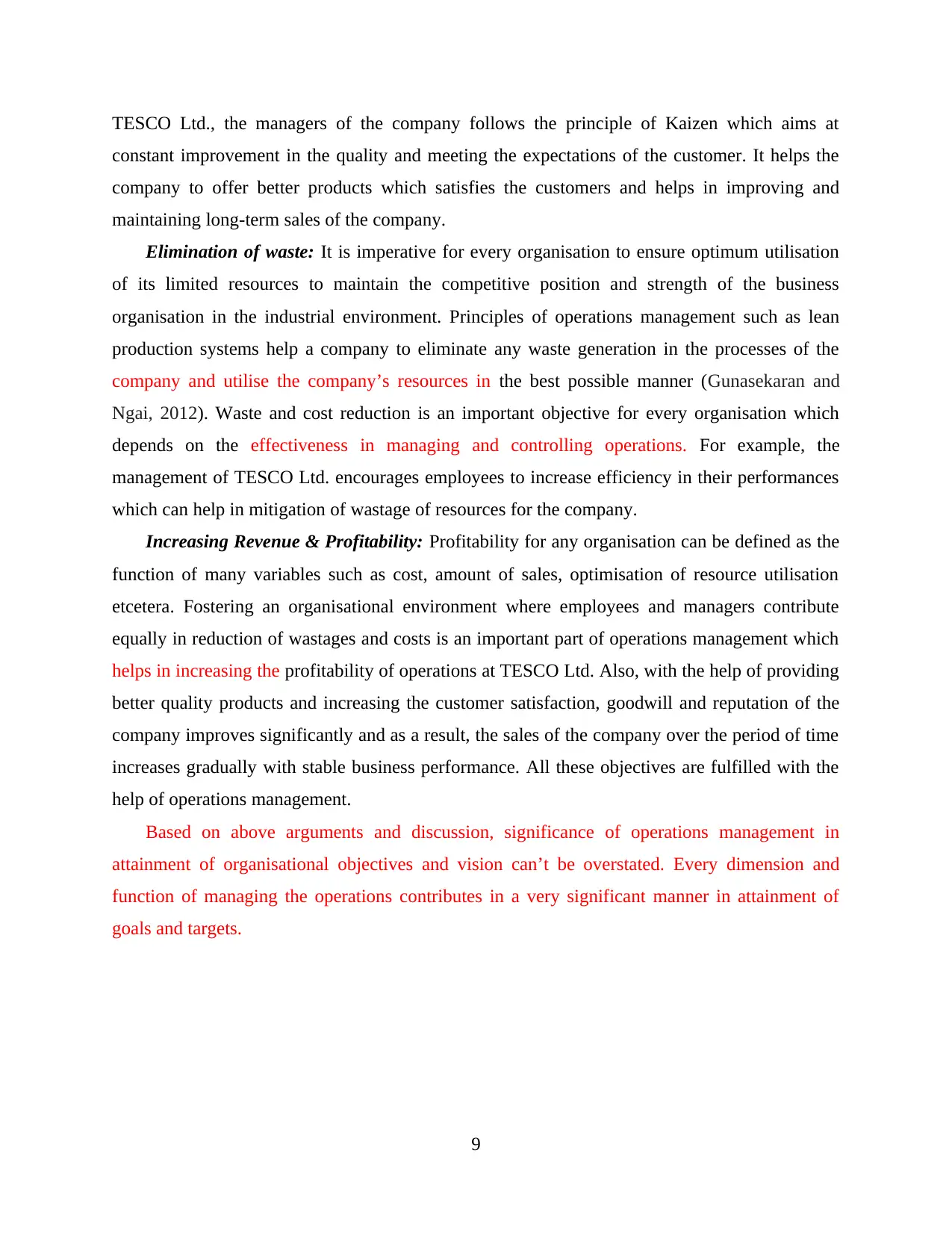
TESCO Ltd., the managers of the company follows the principle of Kaizen which aims at
constant improvement in the quality and meeting the expectations of the customer. It helps the
company to offer better products which satisfies the customers and helps in improving and
maintaining long-term sales of the company.
Elimination of waste: It is imperative for every organisation to ensure optimum utilisation
of its limited resources to maintain the competitive position and strength of the business
organisation in the industrial environment. Principles of operations management such as lean
production systems help a company to eliminate any waste generation in the processes of the
company and utilise the company’s resources in the best possible manner (Gunasekaran and
Ngai, 2012). Waste and cost reduction is an important objective for every organisation which
depends on the effectiveness in managing and controlling operations. For example, the
management of TESCO Ltd. encourages employees to increase efficiency in their performances
which can help in mitigation of wastage of resources for the company.
Increasing Revenue & Profitability: Profitability for any organisation can be defined as the
function of many variables such as cost, amount of sales, optimisation of resource utilisation
etcetera. Fostering an organisational environment where employees and managers contribute
equally in reduction of wastages and costs is an important part of operations management which
helps in increasing the profitability of operations at TESCO Ltd. Also, with the help of providing
better quality products and increasing the customer satisfaction, goodwill and reputation of the
company improves significantly and as a result, the sales of the company over the period of time
increases gradually with stable business performance. All these objectives are fulfilled with the
help of operations management.
Based on above arguments and discussion, significance of operations management in
attainment of organisational objectives and vision can’t be overstated. Every dimension and
function of managing the operations contributes in a very significant manner in attainment of
goals and targets.
9
constant improvement in the quality and meeting the expectations of the customer. It helps the
company to offer better products which satisfies the customers and helps in improving and
maintaining long-term sales of the company.
Elimination of waste: It is imperative for every organisation to ensure optimum utilisation
of its limited resources to maintain the competitive position and strength of the business
organisation in the industrial environment. Principles of operations management such as lean
production systems help a company to eliminate any waste generation in the processes of the
company and utilise the company’s resources in the best possible manner (Gunasekaran and
Ngai, 2012). Waste and cost reduction is an important objective for every organisation which
depends on the effectiveness in managing and controlling operations. For example, the
management of TESCO Ltd. encourages employees to increase efficiency in their performances
which can help in mitigation of wastage of resources for the company.
Increasing Revenue & Profitability: Profitability for any organisation can be defined as the
function of many variables such as cost, amount of sales, optimisation of resource utilisation
etcetera. Fostering an organisational environment where employees and managers contribute
equally in reduction of wastages and costs is an important part of operations management which
helps in increasing the profitability of operations at TESCO Ltd. Also, with the help of providing
better quality products and increasing the customer satisfaction, goodwill and reputation of the
company improves significantly and as a result, the sales of the company over the period of time
increases gradually with stable business performance. All these objectives are fulfilled with the
help of operations management.
Based on above arguments and discussion, significance of operations management in
attainment of organisational objectives and vision can’t be overstated. Every dimension and
function of managing the operations contributes in a very significant manner in attainment of
goals and targets.
9
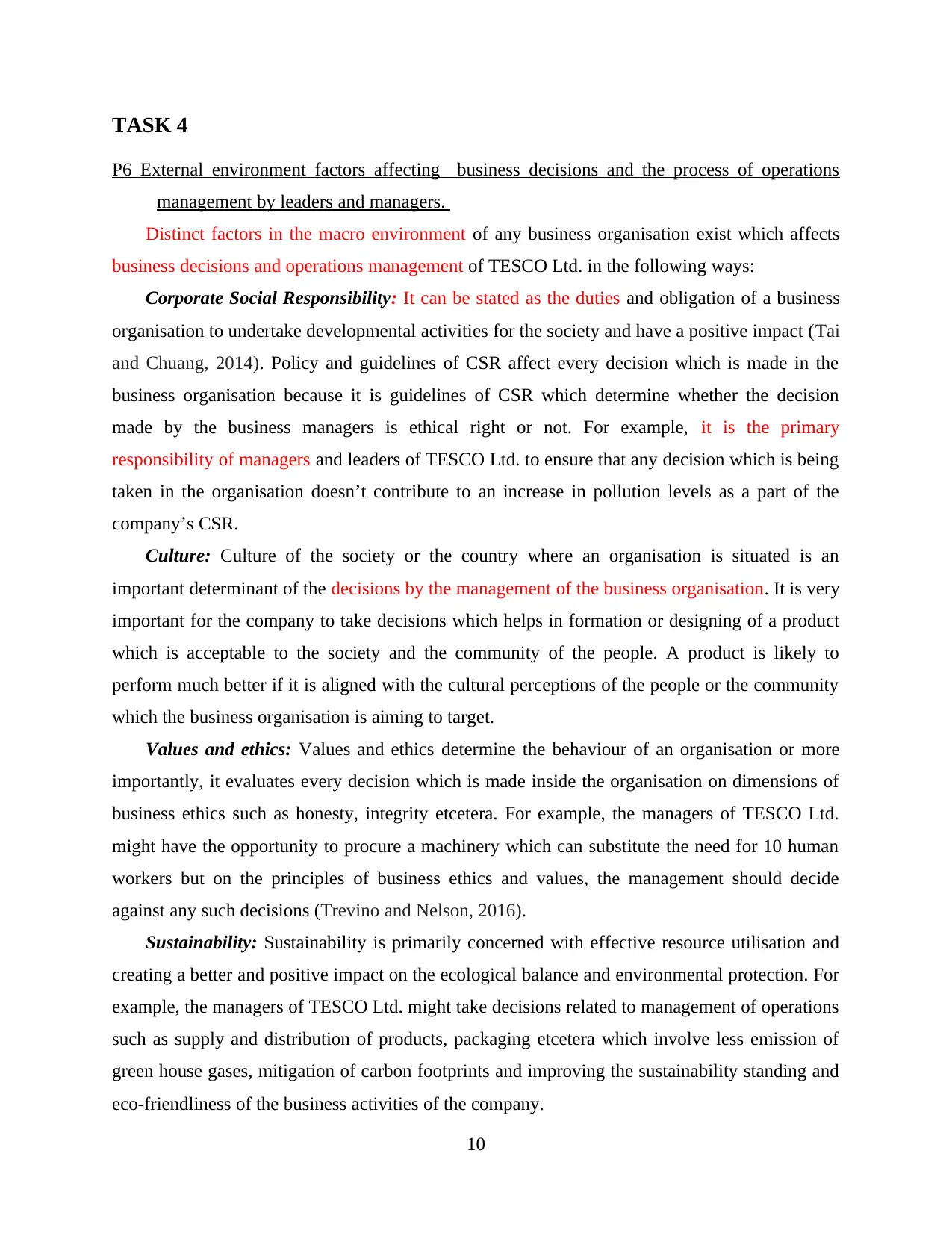
TASK 4
P6 External environment factors affecting business decisions and the process of operations
management by leaders and managers.
Distinct factors in the macro environment of any business organisation exist which affects
business decisions and operations management of TESCO Ltd. in the following ways:
Corporate Social Responsibility: It can be stated as the duties and obligation of a business
organisation to undertake developmental activities for the society and have a positive impact (Tai
and Chuang, 2014). Policy and guidelines of CSR affect every decision which is made in the
business organisation because it is guidelines of CSR which determine whether the decision
made by the business managers is ethical right or not. For example, it is the primary
responsibility of managers and leaders of TESCO Ltd. to ensure that any decision which is being
taken in the organisation doesn’t contribute to an increase in pollution levels as a part of the
company’s CSR.
Culture: Culture of the society or the country where an organisation is situated is an
important determinant of the decisions by the management of the business organisation. It is very
important for the company to take decisions which helps in formation or designing of a product
which is acceptable to the society and the community of the people. A product is likely to
perform much better if it is aligned with the cultural perceptions of the people or the community
which the business organisation is aiming to target.
Values and ethics: Values and ethics determine the behaviour of an organisation or more
importantly, it evaluates every decision which is made inside the organisation on dimensions of
business ethics such as honesty, integrity etcetera. For example, the managers of TESCO Ltd.
might have the opportunity to procure a machinery which can substitute the need for 10 human
workers but on the principles of business ethics and values, the management should decide
against any such decisions (Trevino and Nelson, 2016).
Sustainability: Sustainability is primarily concerned with effective resource utilisation and
creating a better and positive impact on the ecological balance and environmental protection. For
example, the managers of TESCO Ltd. might take decisions related to management of operations
such as supply and distribution of products, packaging etcetera which involve less emission of
green house gases, mitigation of carbon footprints and improving the sustainability standing and
eco-friendliness of the business activities of the company.
10
P6 External environment factors affecting business decisions and the process of operations
management by leaders and managers.
Distinct factors in the macro environment of any business organisation exist which affects
business decisions and operations management of TESCO Ltd. in the following ways:
Corporate Social Responsibility: It can be stated as the duties and obligation of a business
organisation to undertake developmental activities for the society and have a positive impact (Tai
and Chuang, 2014). Policy and guidelines of CSR affect every decision which is made in the
business organisation because it is guidelines of CSR which determine whether the decision
made by the business managers is ethical right or not. For example, it is the primary
responsibility of managers and leaders of TESCO Ltd. to ensure that any decision which is being
taken in the organisation doesn’t contribute to an increase in pollution levels as a part of the
company’s CSR.
Culture: Culture of the society or the country where an organisation is situated is an
important determinant of the decisions by the management of the business organisation. It is very
important for the company to take decisions which helps in formation or designing of a product
which is acceptable to the society and the community of the people. A product is likely to
perform much better if it is aligned with the cultural perceptions of the people or the community
which the business organisation is aiming to target.
Values and ethics: Values and ethics determine the behaviour of an organisation or more
importantly, it evaluates every decision which is made inside the organisation on dimensions of
business ethics such as honesty, integrity etcetera. For example, the managers of TESCO Ltd.
might have the opportunity to procure a machinery which can substitute the need for 10 human
workers but on the principles of business ethics and values, the management should decide
against any such decisions (Trevino and Nelson, 2016).
Sustainability: Sustainability is primarily concerned with effective resource utilisation and
creating a better and positive impact on the ecological balance and environmental protection. For
example, the managers of TESCO Ltd. might take decisions related to management of operations
such as supply and distribution of products, packaging etcetera which involve less emission of
green house gases, mitigation of carbon footprints and improving the sustainability standing and
eco-friendliness of the business activities of the company.
10
⊘ This is a preview!⊘
Do you want full access?
Subscribe today to unlock all pages.

Trusted by 1+ million students worldwide
1 out of 14
Related Documents
Your All-in-One AI-Powered Toolkit for Academic Success.
+13062052269
info@desklib.com
Available 24*7 on WhatsApp / Email
![[object Object]](/_next/static/media/star-bottom.7253800d.svg)
Unlock your academic potential
Copyright © 2020–2025 A2Z Services. All Rights Reserved. Developed and managed by ZUCOL.





